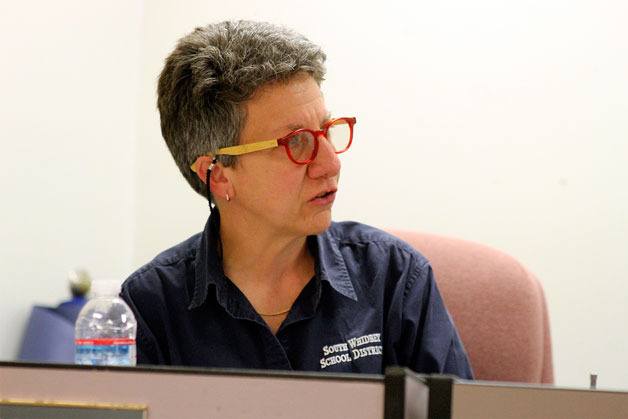Barely a week after administrators cut 6.5 positions in the South Whidbey School District, the school board gave the district’s top two officials a 6.8 percent raise.
Salary hikes for Superintendent Jo Moccia and Assistant Superintendent of Business Dan Poolman were approved at the school board’s May 25 meeting. The increase is the same amount the teachers union successfully negotiated following a five-day strike in 2015. The union will also get a 5 percent increase in 2018, which Moccia and Poolman won’t receive.
According to Director Linda Racicot, chairwoman of the school board, the raises were long overdue and well deserved. Moccia has been with the district for six years and hasn’t always received annual salary increases.
“There were a couple years where we didn’t give her a raise at all,” said board Chairwoman Linda Racicot said. “This was the time to do it.”
Included in Moccia’s new contract, beginning July 1 and ending June 30, 2019, is a raise from $148,000 to $158,000. It will be the second biggest in Moccia’s five years with the district. She received a $13,000 increase in 2015, which followed a $2,500 increase in 2014. Her salary was $132,500 in 2012 and 2013.
School Board Director Damian Greene said it was also clear that Moccia’s pay ranked her in the bottom third of nearby superintendents and the increase would help bridge the gap. That fact appears to be true on Whidbey Island.
Oak Harbor School District Superintendent Lance Gibbon’s total salary was $166,519 for the 2015-16 school year. Coupeville School District James Shank’s superintendent salary was $155,630 during the 2015-16 school year. Coupeville’s district enrollment is 925.
“She’s multi-tasking and I think we’re getting a pretty good bang for our buck,” Greene said.
Racicot said the board determines the salaries of administrators every year and decided it would use the same percentage increase teachers received. Neither Moccia nor Poolman are part of the teachers union, however; both have roles that require them to negotiate on behalf of the district, and membership would be a conflict of interest.
Attempts to reach union officials for comment were not successful for this story.
Poolman’s annual salary for the 12 months, beginning, July 1, will be $114,950. Poolman’s salary was $107,650 this year.
Staying competitive with other school districts to retain a familiar and knowledgeable face is a primary goal of the board, Racicot said.
“Stability within our district is the most important thing,” Racicot said. “We feel the same way with our teachers. We hate to have changes with our staff, and to start over with a new superintendent puts a district behind.”
“We value our superintendent and we want to have a competitive salary. We do feel that we do, but it’s not extravagant in any way,” she added.
In the eyes of Racicot and Greene, both administrators earned their raises. Among Moccia’s accomplishments while at the helm include the reduction of the district’s carbon footprint through relocation and renting of school facilities, consolidation of the district office and playing an instrumental part in developing the school farm and garden program and garden-based curriculum. The district is the first in the nation to follow the Chartwells School Garden Guide protocols to deliver produce on a regular basis for school lunches, Racicot said.
Moccia is also the public records officer for the district. Racicot said districts typically hire an employee to cover the job.
“We have our most expensive employee doing public records,” Racicot said. “She’s developed a really strong admin team and there’s a leadership there that’s created that for them.”
Moccia did so in the face of district-wide enrollment decline that nets fewer monies from the state, due to the education system’s funding methodology.
Among the most important of her responsibilities for the 2016-17 school year will be facilitating meetings on facilities usage and programming, Moccia said. The district is currently compiling questions received at a May 18 community meeting to be answered at a meeting in September.
Moving South Whidbey students through the education system to be college and career ready is also a primary goal, she said.
“We’re really doing good work,” Moccia said. “This next year will be all about the community conversations and making sure we’re using our facilities efficiently. There’s lots of positives happening in the district and I’m excited by the work we’re doing.”



